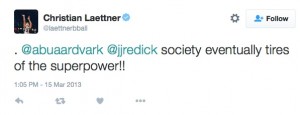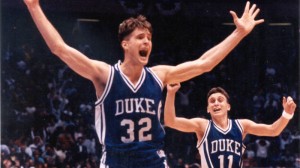By Marc Lynch
March 14, 2013
America’s March Madness Problem
With March Madness rolling into view, the sports website Grantland ran a brilliant bracket of the most hated college basketball players in the last 30 years. It presented one bracket each for the 1980s, 1990s, and 2000s … and one just for Duke. It says something profound about the national loathing for my alma mater that Blue Devils could easily have filled an entire second region (Chris Collins, anyone?) — which would beyond a shadow of a doubt produce the J.J. Redick-Christian Laettner final of everyone’s dreams.
The visceral distaste for the Blue Devils seems to be one of the few things that unites Americans of all description. You can even buy “Duke Sucks: A Completely Evenhanded, Unbiased Investigation Into the Most Evil Team on the Planet.” A few years back, Duke dominated an MSNBC poll on the most hated team in any sport, with 53 percent naming the Devils over every other team in every other sport in the world. Slate’s got a slideshow of the 18 most hateable moments in Duke basketball history — could any other team even come up with three?
Why all the hate? Sure, objectively, Duke appears to represent the best of college sports: graduating most of its players, while running a system built around individual freedom and creativity on offense anchored by hard-nosed, relentless teamwork on defense. But in popular mythology, Duke has become an avatar of an overly white, overrated, and overly praised team with an air of entitled superiority.
This national consensus is fascinating, in that it seems utterly blind to what the rest of the planet knows deeply and profoundly: In world politics, we’re Duke. Americans like to think they are Butler, the scrappy unheralded Midwestern underdogs one shot away from a miracle. But let’s be real. The United States is a global superpower, since 1990 the unipolar hegemon atop the global order. In the Middle East it is the imperial hub, a status quo power with deep security and military alliances with almost every regime and global sanctions against the few remaining “rogues.” When the world looks at the United States, it doesn’t see Butler. It sees Duke.
Despite their country’s overwhelming global dominance, Americans have struggled to comprehend the depth and resilience of hostile attitudes and negative perceptions. In a 2008 survey by the Chicago Council on Global Affairs, Americans rated restoring their country’s global standing above any other national priority — including combating terrorism and protecting jobs. The whole tenor of the “why do they hate us” punditry meme suggests just how much this global distaste upsets Americans. But if Americans want to understand the resilience of anti-Americanism, they could do worse than to examine their feelings about Duke.
Conventional explanations of anti-Dukism mirror those of anti-Americanism. Some see it as a natural outgrowth of dominance, attracting the incomprehension and resentment of the less fortunate. Everyone hates Mr. Big. But this is not satisfying. Sure, the Blue Devils have been dominant, with their four national championships, 15 Final Four appearances, 11 national players of the year, and the best winning percentage in tournament history. But other teams have been as dominant over as extended a period without inspiring such hatred: who loses sleep over Kentucky, Connecticut, North Carolina, or even UCLA?
Duke’s dominance has also not been nearly as comprehensive as this account would suggest. Nor, one might argue, has America’s. Both only rose to this position in 1990. During the Cold War, the United States was always checked by its superpower peer competitor, and Duke had memories of Mike Gminski. For the United States, the collapse of the Soviet Union, the reunification of Germany within NATO, and the United Nations’ blessing for the liberation of Kuwait established it as the sole global superpower. Duke emerged in the mid-1980s (morning in America!), but only reached the top by beating the mighty UNLV “Running Rebels” and the Kansas Jayhawks in the 1991 Final Four for its first championship, and then repeating the next year, along the way defeating Kentucky in perhaps the greatest college basketball game ever. This was peak Laettner, the foundational moment for anti-Dukism.
But the mid-1990s saw struggles for both. Bill Clinton’s administration grappled with a radical Republican Congress at home, struggling to maintain the containment of Iraq and deal with the wars of the former Yugoslavia abroad. Duke’s 1994 season collapsed when Coach K stepped down for emergency back surgery. Over the next few years, the world watched incredulously as Clinton was impeached over Monica Lewinsky and Duke somehow lost to Eastern Michigan. But none of these struggles affected now well-entrenched attitudes.
By early 2001, both were back with a vengeance: The United States sat comfortably atop an increasingly institutionalized liberal order and Duke had defeated Arizona for its third championship. But by the middle of the decade, like America bogged down in its Iraqi quagmire, Duke proved mortal indeed. In 2006, a good Duke team led by Redick lost a brutal matchup with LSU. In the following years, no surge could save Duke: It lost in 2007 to 11th-seeded Virginia Commonwealth, in 2008 to 7th-seeded West Virginia*, and in 2009 to Villanova. Like the United States under its new president, Duke surged back to win the national championship in 2010, but this return to the top — like America’s global approval ratings under Obama — proved fleeting: Two years later, it somehow lost to Lehigh (Lehigh!) in the first round.
But anti-Dukism, like anti-Americanism, did not seem to rise and fall smoothly with actual policies. These shocking Duke losses generated gleeful celebration rather than any perceptible sympathy. Negative views of the United States have proven similarly resilient over the last decade, particularly in the Middle East, where a brief uptick following Obama’s election quickly disappearing. This could be because the underlying structural realities never really changed: Duke may have struggled in the tournament, but continued to dominate the Atlantic Coast Conference, take top seeds in the NCAA tourney almost every year, and recruit a steady stream of top talent. The United States may have elected a new president, withdrawn from Iraq, changed its tone toward Islam, and supported transitions in Egypt, but it maintained its support for many repressive regimes, escalated drone strikes, didn’t close Guantánamo, and maintained its close alliance with Israel.
But this explanation remains unsatisfying. A lot remained constant in Durham and Washington, but a lot changed too, with little evident impact on attitudes. Why did the United States get no credit from the Muslims of the world for intervening in Bosnia? Why does Duke get no credit for universally acknowledged good guys like Grant Hill and Elton Brand, while Laettner’s legend lives forever? Political scientists Peter Katzenstein and Robert Keohane, in an influential book (to which, full disclosure, I contributed a chapter) had an answer: anti-Dukism, like anti-Americanism, is best understood as a form of cognitive bias.
When such a bias takes root, new information tends to be processed in such a way as to confirm existing beliefs. Rather than fluidly updating opinions based on new evidence, people who have internalized such a bias will tend to fit the new information to their narrative. Thus, when the United States withdraws support from Egypt’s Hosni Mubarak after nearly 30 years it is not because it wants democracy but rather because it wants to preserve the military’s power; when Washington then pushes the military to transfer power to an elected civilian government, it can’t be because it supports democracy but rather must mean that it views the Muslim Brotherhood as the functional equivalent of Mubarak’s National Democratic Party. Something similar operates with anti-Dukism: Sure, many Duke players have a certain attitude that rubs people the wrong way, but Katzenstein and Keohane would suggest that it is the jersey rather than the player that sparks the outrage. When Seth Curry’s older brother starred at Davidson, everyone raved about his courage and skill, but with a blue and white jersey on the younger brother becomes unbearably smug and manifestly overrated. Bobby Hurley at Indiana would be the epitome of hard-nosed hustle, but at Duke he was, well, Bobby Hurley.
The media likely plays a role in all this, of course. There’s just the sheer ubiquity: American sports fans can no more avoid seeing Duke on television than Arabs could avoid seeing American troops in Iraq on Al-Jazeera. But it goes beyond that. Every year, ESPN audiences have to endure odes to the Cameron Crazies, Dick Vitale’s ravings about the character of an (often white) Duke star, and endless paeans to the virtues of man-to-man defense and motion offense as some sort of uniquely Dukian innovation. Similarly, across the globe, foreign audiences have to endure lectures about American exceptionalism, global problems defined by how they affect American interests, and a public sphere saturated with American values. As Coach K once put it, “[W]e arouse passion [because] we’re in a different world. I’m not sure we’re in a world many people have been on, we just have to learn how to manage it.” This is not the sort of self-reflection others find endearing. The casting of Duke and America as exceptional, and insistence that all recognize their universal appeal likely explains some portion of the backlash against both.
A careful study of anti-Dukism does not offer any clearly actionable guidance for American public diplomacy, alas. Sinking into mediocrity might reduce the venom, but hardly seems a price worth paying. Actively seeking to engage critics across multiple platforms is more likely to generate antagonism than win over hearts and minds. Replacing Bush with Obama had no more lasting impact than did replacing J.J. Redick with Jon Scheyer. Obama may try to de-Dukify by making the United States a bit less brash, a bit more respectful, and well, a bit less white, but like Coach K he will still want America to win. The best Washington can do, then, is to simply ignore the haters and do the right thing — which, in this case, means bringing the national championship back to Durham on April 8!
Originally published on ForeignPolicy.com, March 14, 2013

